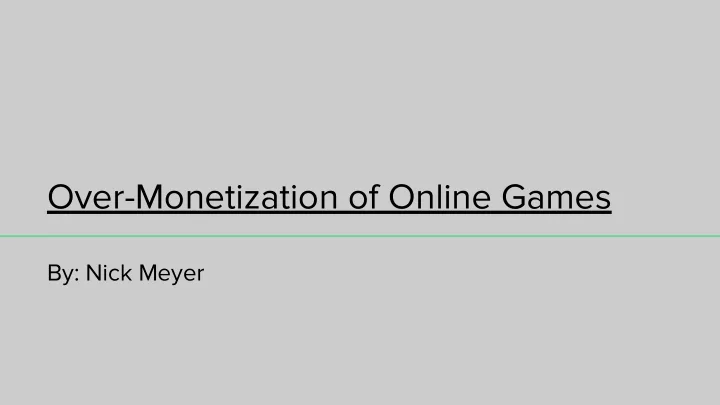

Over-Monetization of Online Games By: Nick Meyer
History ● Online games have evolved a lot in a short amount of time. ○ Huge improvements is communication, graphics, and development in general. ● Older games had a straightforward business model. ● MMOs would generate their revenue with subscription fees and expansions in most cases. ● DLCs were occasionally offered for certain games like CoD and Fallout 3. ● With growth of mobile gaming, came new forms of monetization.
History Cont. ● Microtransactions saturate free mobile games. ○ Clash of Clans, Candy Crush. ● Microtransactions implemented in traditional games. ● Loot boxes become common monetization method. ○ Overwatch, PUBG, Apex Legends ● Business model proved to be very lucrative. ● Shift in focus for companies to focus on further monetization methods.
Progression ● Most monetization accepted by gaming community. ● Companies need to make money. ● Reasonable prices for DLC and expansions. ○ Long development times and significant amount of added content. ● Rising price of games. ○ Cost of development, and distribution. ○ Added monetization schemes. ● Push for pre-orders of new games. ○ Leads to inferior product.
Bad Business ● EA’s Star Wars: BattleFront 2… ● $60 base price up to $100 for special editions. ● All that, with a side order of predatory monetization. ● Absurd amount of play time required to unlock the games content. ○ Approximately 4,500 hours for enough points to unlock all in-game content. ● Time shortened by spending more money. ○ Estimated cost to unlock content with money $2,100. ● Massive consumer backlash. ○ EA lost $3.1 billion in stock market value. ● EA is not the only ones who have done this.
Regulation ● Belgium and The Netherlands classify virtual loot-boxes as form of gambling and outlaw them. ● U.K.’s gambling commission looking into the use of loot-boxes in games. ● Here in the U.S. the Federal Trade Commission(FTC) has opened an investigation as well. ● Regulations on the business practices of these companies could be coming soon.
What Can Be Done? ● Wait to purchase a game after it has been released and has been reviewed by trusted individuals. ● Avoid games from companies who have repeatedly implemented predatory monetization systems. ● Don’t blame the individual game developers, they are hurt from these practices as well. ● Support games and companies who are doing the right thing. ○ Empower them to compete.
Future ● Small chance of these massive companies shifting focus away from monetization techniques. ○ Pressure from parent companies, and investors. ● Potential regulation. ● Rising competition from free-to-play games. ● Show these companies we won’t be exploited. ○ Don’t use microtransactions. ○ Don’t pre-order games. ● Hopefully see some large companies take a different route after seeing backlash towards EA.
Questions?
Recommend
More recommend